Karsha Phodrang, Zanskar, Ladakh, India - Today, the early morning sun shone down the valley of the Zanskar river. His Holiness the Dalai Lama’s throne had been set up on the veranda of the Karsha Phodrang facing Karsha Monastery. Of the estimated 21,000 people who had gathered to listen to his teaching, monastics sat in the temple behind him and laypeople sat under umbrellas on the ground in front of him. Several groups of schoolchildren, monks and nuns were engaged in debate when His Holiness arrived. He surveyed the crowd, smiled and waved to them, then took his seat.
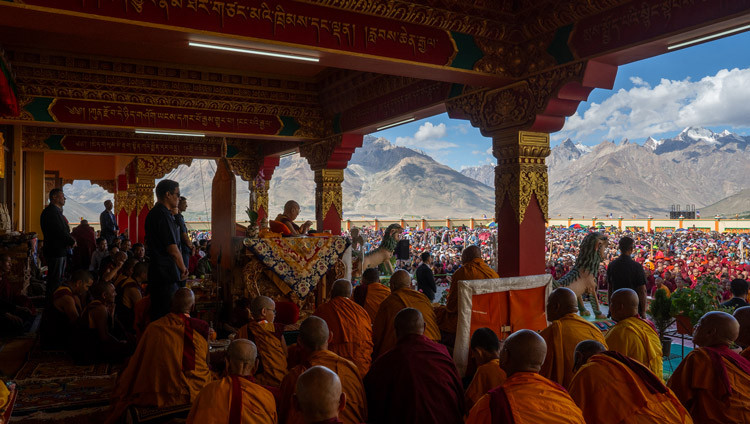
The ‘Heart Sutra’ was recited in Tibetan, followed by the verse of salutation from the ‘Ornament for Clear Realization’. Then a mandala symbolizing the entire universe was offered, after which this verse was chanted:
May the sound of the great dharma drum
Dispel the misery of sentient beings.
May you live to give teachings
for inconceivable billions of aeons.
Before he started to teach, His Holiness thrilled the local people by putting on a Zanskari Lama’s hat, as if he was one of them. Applause rippled through the crowd.
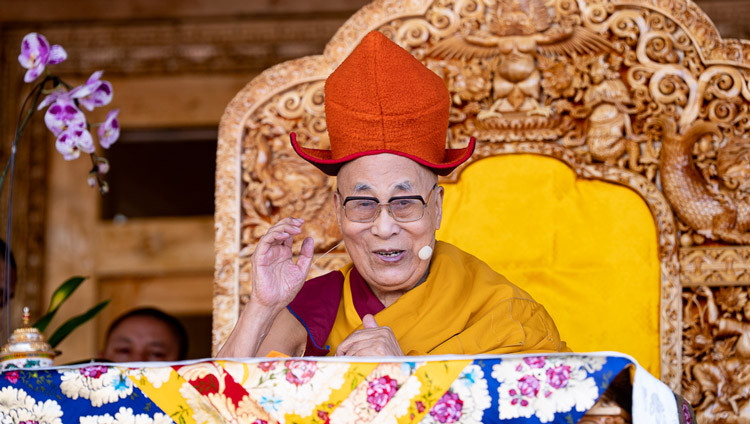
“Today, in this region of India we have gathered for a Dharma discourse,” he began. “It’s my aim to give everyone an introduction to the teaching of the Buddha. In Tibet, the Land surrounded by Snow Mountains, Buddhism spread. But for the present we have lost our country. However, the complete teaching of the Buddha, that we preserved in Tibet, now prevails in the Himalayan Region. The teaching of the Buddha will flourish for a long time yet. In the West, where people are scientific minded, many are taking an interest in our traditions,
“Transforming the mind is not new to us, yet in other parts of the world there is a fresh interest in the teaching of the Buddha.
“When we say, “I take refuge in the Buddha ...” we should know what the word Buddha means. The first syllable of the Tibetan term ‘Sang-gyé’ indicates someone who has overcome all defilements that comprise destructive emotions and their residual stains. The second syllable represents seeing everything there is to be known, such as the Two Truths, clearly. The Buddha, therefore, is someone who has overcome all negativities and gained full and clear knowledge of everything to be known.
Chö, the Tibetan word for Dharma, indicates something that protects you. What does it protect you from? We should study and find out.
“The Buddha taught the Four Noble Truths to begin with and finally passed into parinirvana. In between, he gave extensive teachings. In due course, masters like Nagarjuna explained these teachings in the light of reason and logic.
“Buddhism was brought to Tibet during the reigns of Emperors Songtsen Gampo and Trisong Detsen. The latter invited Shantarakshita, Kamalashila and Guru Padmasambhava to Tibet who introduced and established the scriptural and realizational teachings of Sutra and Tantra.
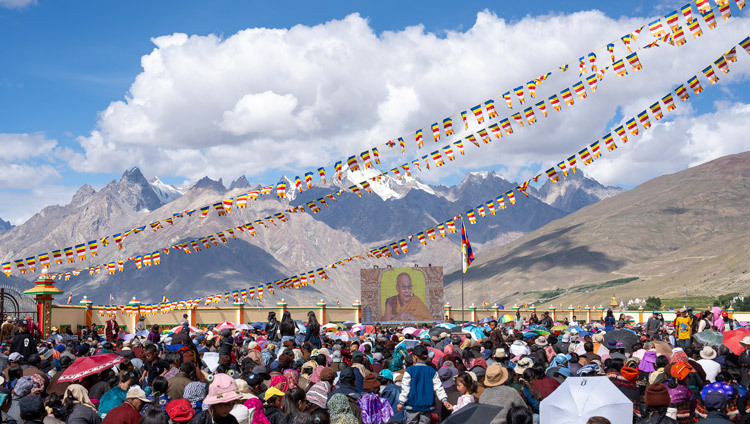
“The Dharma has to do with training the mind. It’s not about building temples and stupas. It’s about transforming the mind. For example, if you can cultivate patience, you’ll be able to cope with problems and difficulties without feeling despondent. You’ll have the courage to follow the path the Buddha followed and taught.
“You’ll need to understand what suffering is and why it comes about. As I said, the teaching gives us the courage to face difficulties. In my own case, I’ve studied the Buddha’s teaching since I was a child due to the kindness of my teachers. To begin with I didn’t appreciate the purpose of the teachings, but as I grew up, I began to understand how practical and useful they were in my life. When I’ve been confronted by different challenges, my spiritual understanding has made a difference. Understanding the teaching helps you stay calm.
“My main practice is the twofold cultivation of the awakening mind of bodhichitta and the view of emptiness. I employ analysis to understand emptiness and I find it really helpful.
“What does the Buddha’s teaching involve? It provides an opportunity to transform your mind without allowing disturbing emotions to overwhelm you. What’s important is to study the teaching, understand and apply it.”
Indicating the collossal new statue of the Buddha below Karsha Monastery, His Holiness explained that when we see images of the Buddha, they should remind us to think about what he taught. “I was born far away in Amdo and came to Lhasa where I heard the teachings, thought about them and put them into practice. I believe that by practising the Buddha’s teaching we’ll not only transform our own minds, but will also be able to contribute to social harmony.
“We’ve gathered here in Zanskar not with any political motive, but, due to our faith and past prayers. We need to study, reflect and acquire the taste of the teaching. It’s not about external glamour. It’s about cultivating a calm, peaceful mind and inner strength. Our aim is to lead a meaningful life with peace of mind. If you study, you’ll gain conviction in the teaching. If you achieve insight on the basis of reason and logic, you’ll be able to transform your mind and achieve inner peace.
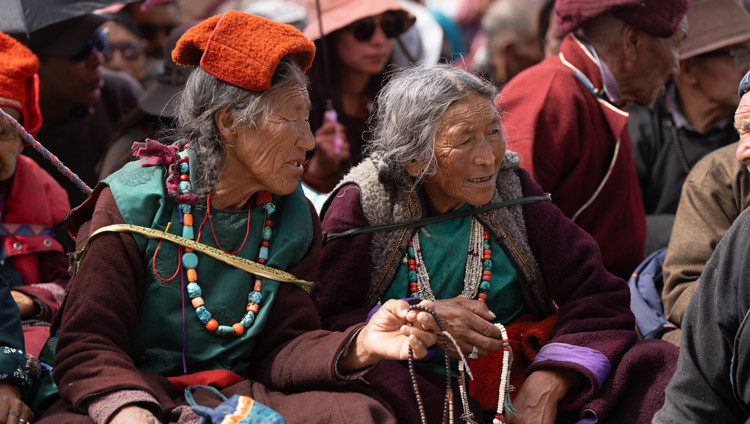
“Today, I’ve been asked to talk about the short text, the ‘Three Principles of the Path’. It begins by paying respects to the teachers and goes on: ‘I will explain as well as I am able the essence of all the teachings of the Conqueror, the path praised by the Conqueror's offspring, the entrance for the fortunate who desire liberation.’
“Verse three says, ‘Without a pure determination to be free there is no way to still
attraction to the pleasures of cyclic existence. Thus, from the outset seek a determination to be free. Verse four continues: Leisure and opportunity are difficult to find; there is no time to waste; reverse attraction to this life. Reverse attraction to future lives. Think repeatedly of the infallible effects of action and the misery of this world.’
“When you look at the world different people are attached to the joys of this life which are a source of suffering, aren’t they? When you have a serious determination to be free, your mind will be calm and you won’t try to harm others. In the various religions of the world, such as Christianity and Islam, when followers are sincere in their practice, there is peace where they live.
“This human existence has 18 special qualities. It’s an opportunity to study the teachings and live a meaningful life. If you don’t understand the teachings, they won’t help you achieve greater happiness for self and others.
“As verse three says: ‘Without a pure determination to be free there is no way to still attraction to the pleasures of cyclic existence. Thus, from the outset seek a determination to be free.’
“When I was a child, I had only a little sense of altruism towards others. Then my teachers, Ling Rinpoché and Trijang Rinpoché, taught me about it, I reflected on it and my sense of concern for others developed and grew. As a result, when I look back on my life now, I feel it has been meaningful.
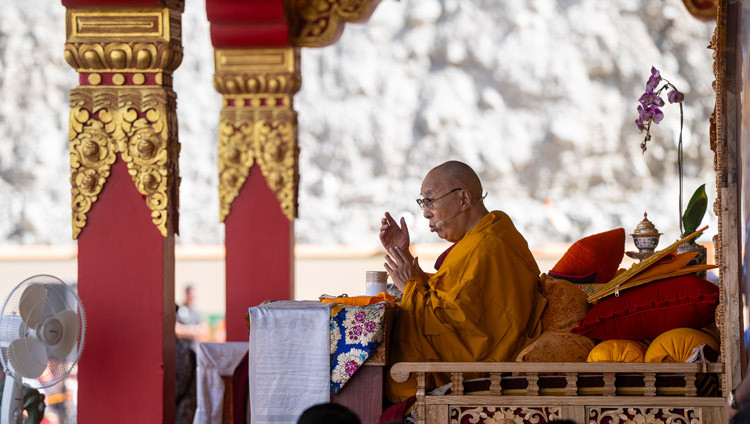
“I’ve faced all sorts of challenges, but with the help of a determination to be free, the awakening mind and the correct view of emptiness I’ve remained steadfast in my determination to follow the Buddha’s teaching. When I see conflict in the world, my courage and wish to help others increases. It helps not to be depressed but to cultivate inner strength and loosen the grip of self-centredness.
“In the cycle of existence suffering arises everywhere as a result of different causes and conditions. When you see suffering you are prompted to develop a determination to be free. I observe that people want to be happy, but mostly they are occupied with the pleasures of this life. When I think about my own life, I recognize how good it is that I don’t have this kind of attachment. I am focused instead on working for the benefit of others.
“When you let your mind be tossed here and there by hatred and attachment, you’ll only face suffering and trouble. If you develop some degree of an altruistic awakening mind you can feel confident about this life and the next.
“As far as I’m concerned, I don’t wish to be boastful, but as soon as I wake up every morning, I reflect on the awakening mind of bodhichitta. It helps me develop the confidence to work for others’ welfare.
“As verse six says: ‘A determination to be free without a pure mind of enlightenment does not bring forth the perfect bliss of unsurpassed enlightenment; therefore, Bodhisattvas generate the excellent mind of enlightenment.’ Verses seven and eight outline how to generate such a mind: ‘Swept by the current of the four powerful rivers, tied by strong bonds of actions so hard to undo, caught in the iron net of the misconception of self, completely enveloped by the darkness of ignorance, born and reborn in boundless cyclic existence, ceaselessly tormented by the three miseries all beings, my mothers, are in this condition. Thinking of them I generate the mind of enlightenment.’
“Everyone else is like me in not wanting to suffer, but wanting to be happy. But through not understanding what causes suffering and what the causes of happiness are, we allow ourselves to be overwhelmed by the three poisons, greed, anger and delusion. When we familiarize our minds with bodhichitta and we see others suffering, we wish to work for their benefit by attaining enlightenment.
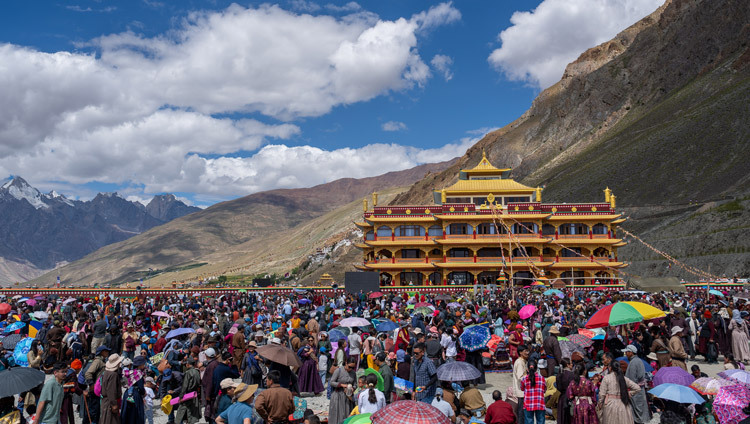
“This is reflected in the lines of verse eight: ‘Ceaselessly tormented by the three miseries all beings, my mothers, are in this condition. Thinking of them I generate the awakening mind.’
“As I’ve already said, ‘Everyone wants to be happy and not to suffer, but suffering befalls us while happiness seems to be so far away. Therefore, we need to think about working for the benefit of others who are our suffering mothers.’
“The reasons for developing the correct view are that as verse nine makes clear: ‘Though we may practise the determination to be free and the awakening mind, without wisdom, the realization of emptiness, we cannot cut the root of cyclic existence, therefore we strive to understand dependent arising.’
“Dependent means that whatever there is, whether external or internal, even up to the highest qualities of the Buddha, dependence does not deflect understanding of emptiness. Arising refers to how things are in terms of their causes and conditions—their conventionality.
“To work for happiness by creating the causes of happiness and conquering suffering by overcoming its causes, is very good. If you reflect on bodhichitta, which I do, as well as the view of emptiness, both of which I reflect on as soon as I wake up, you’ll find they really provide practical benefits. None of you here want suffering; you want to be happy. Suffering comes about because of our self-cherishing attitudes. To counter those we should try to cherish others as much as we can and weaken our self-centred attitudes.
“This is how to transform your mind by cultivating an altruistic attitude. I find this to be really helpful. Reflecting on and familiarizing your mind with cherishing others clearly brings about a transformation within. I urge you to do this as much as you can.
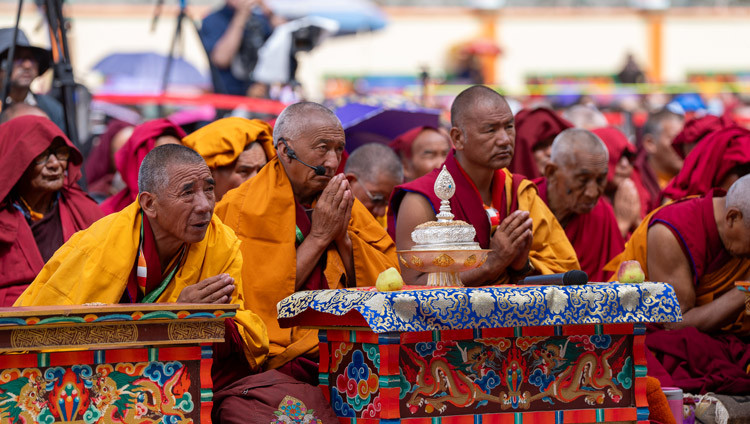
“As I have mentioned, I’ve trained my mind since I was a child and I’ve noticed that year by year my mind has changed. So, my dear Dharma friends, I urge you to develop the awakening mind. Bringing about change in your mind by familiarizing yourselves with these principles is quite natural. Since time without beginning, we have familiarized ourselves with attachment and hatred. If we are able to develop antidotes to these disturbing emotions, we will gradually be able to transform our own minds by diminishing our self-centredness and misconception of reality.
“Verses ten, eleven and twelve tell us that ‘One who sees the infallible cause and effect of all phenomena in cyclic existence and peace, and destroys all false perceptions, has entered the path which pleases the Buddha. Appearances are infallible dependent arising: emptiness is free of assertions. As long as these two understandings are seen as separate, you have not yet realized the intent of the Buddha. But when these two realizations are simultaneous and concurrent, from a mere sight of infallible dependent arising comes certain knowledge which completely destroys all modes of mental grasping. At that time the analysis of the profound view is complete.’
“The three principles of the path to transforming ourselves within are the determination to be free, the altruistic awakening mind and the correct view. I have worked to cultivate these and found them to be really helpful. There are increasing numbers of people interested in the teaching of the Buddha. We too are his followers and must do our best to share what we know for the well-being of the world. When you familiarize your mind with altruism, it will reduce the strength of your self-cherishing attitudes.”
Next His Holiness announced that he would lead a brief ceremony for developing the awakening mind of bodhichitta. To start with he advised all those present to recite the seven-limb prayer to collect merit and purification. He asked those present to repeat the following verses after him.
I seek refuge in the Three Jewels;
Each and every wrongdoing I confess.
I rejoice in the virtues of all beings.
I take to heart the state of Buddhahood.
I go for refuge until I am enlightened
To the Buddha, the Dharma, and the Supreme Assembly,
In order to fulfil the aims of myself and others
I develop the awakening mind.
Having developed the aspiration for highest enlightenment,
I invite all sentient beings as my guests,
I shall enact the delightful supreme enlightening practices.
May I become a Buddha to benefit all sentient beings.
In giving the oral transmission of the mantras of the Buddha, Avalokiteshvara, Manjushri, Arya Tara, the Medicine Buddha, Guru Rinpoché and finally the Mig-tse-ma invocation of Jé Tsongkhapa, he again asked the congregation to repeat after him.
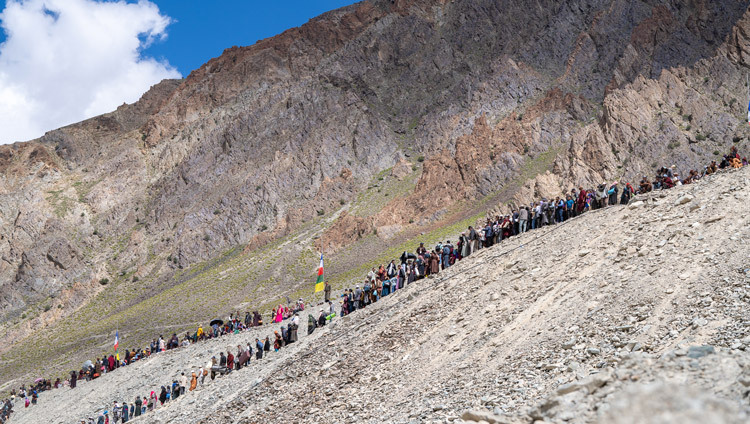
His Holiness’s final words were that the three principles of the path are the supreme method for becoming a true follower of the Buddha.
A thanksgiving mandala was offered, followed by a prayer for His Holiness’s long life, the Words of Truth, an invocation to the guardian deities of Tibet, and verses of auspiciousness.
His Holiness thanked everyone who had taken part in organizing the occasion, as well as everyone who attended.












